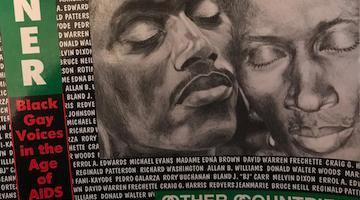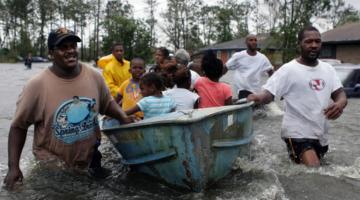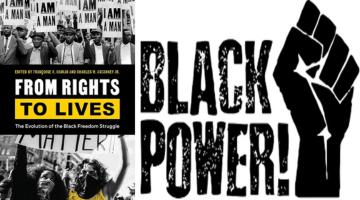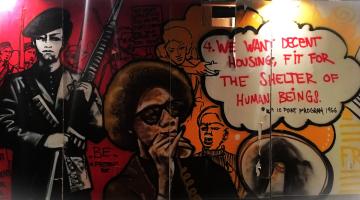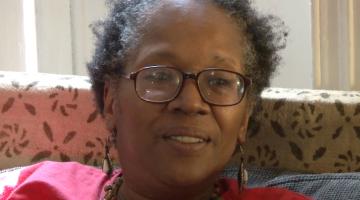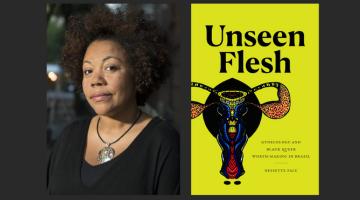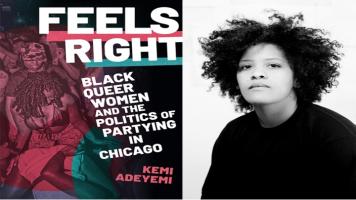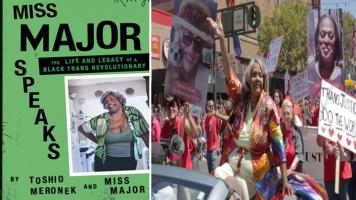Roberto Sirvent: Can you please share a little bit about your background, including how you became involved in community organizing?
August K. Clayton: I can identify different moments where I was politicized as a student organizer, but also as a Black seropositive trans masculine person from rural Southern Maryland. It is a practice that I’ve been in, in movement to return to these points of activation as a catalyst for possibility when we organize around our conditions. I shared during an icebreaker recently that I had no idea I was running campaigns, no idea what organizing was, and never heard of the Black Radical Tradition. I think it's important to share that because oftentimes, movement can feel so hard to enter, to be transformed and developed in service of the work given its about face toward neoliberalism. It's also important to name that my entry into movement is not an attempt to make a case to irresponsibly enter organizing spaces, rather a desire to explore what it could look like to be intentionally orienting Black queer and trans folks, Black working class folks, Black elders, etc. into the Black Radical Tradition of organizing. As I shared earlier, I had no idea what I was doing, I just wanted my conditions to change regarding STI policies, harm reduction, and resourcing trans students, but couldn't tell you what strategy meant, nor what a true politic was. All that to say, while I became involved in organizing eight years ago, I wasn’t developed until much later.
You founded the Mosaic cooperative. What does your team’s approach to healing justice and harm reduction look like?
We recognize the limitations of the 501c3, specifically that we need and are organizing our resources under a lens of self-determination. There has been a long-standing narrative that Black trans men and trans masculine folks do not organize, are not in leadership, and that our only strategy for survival is to be post-operative and stealth. Mosaic does not exist in response to this, rather we approach our resource organizing from a commitment to politicize Black trans men into building and maintaining solidarity economies. Mosaic’s team and its members have endured the bioessentialist narratives that plague our ability to experience belonging, contribute, and participate, meaningfully in our communities. We understand the istsand isms that contribute to collective grief, exhaustion, and reliance on substance use, and provide folks with the tools to use substances [or not] safely, and without judgment. We also recognize the rising costs of HRT (hormone replacement therapy) supplies, the requirement to receive testosterone, proposed rollbacks on telehealth, leading to us using ‘street T,’ shared needles and syringes. Our commitment lies in our constant offerings for whatever event, meeting, retreat that we have, also includes a resource exchange. Even as a small practice of solidarity, Mosaic’s Harm Reduction Lead, Isaiah, and I both carry extra testosterone on us for our sibs who may be out/do not have access while also understanding that we must be making the stakes clear of why we engage in harm reduction strategy, in the healing justice framework, and centralizing the care economy.
Why is it so important for Mosaic to be a trans-led cooperative?
I struggle to make the case for the importance of trans leadership, when we (the trans movement) do not have shared language around the meaning of leadership, liberation, and analysis of power. As a result, it fuels this neoliberal and essentialist strategy around identity on how we move work, who is deserving of resources, and who is deserving of survival. I think the aftermath of 2020 saw to this, resources flooded “work” led by people with particular identities, but failed to develop a politic in the process. This has the masses wanting to give money to “mutual aid” without realizing that much of the work being moved is not organizing, but charity work. I do not believe it is important for Mosaic to be looked at solely on its trans leadership, because our desire is not for representation or visibility. I believe it is critical for trans-led organizations to see organizational models for what is possible with collective decision making, initiative and ownership, as opposed to liberal strategies of assimilation. Our purpose is to organize resources (time, talents, tithes) and relationships toward the safety, security, and self-determination of our folks. This requires shared decision-making power, a material commitment to our community, and politicizing our folks on the way to the land. I believe that we can build power and win, regardless of identity if we restructure our purpose and orientation to the work.
How does your analysis of state violence against trans people shape your organizing work?
It’s interesting you ask about state violence especially considering it’s Black August. I’ve been meditating on the afterlives of slavery and how the ‘collective we’ engages in a process of sanitization through legislative advocacy, awareness campaigns, and a refusal to acknowledge the stakes. We have so many organizations wasting resources, time, and skill negotiating our lives through policy instead of engaging in militant study of the Black Radical Tradition. We recognize that there are many pathways to engage the work, but at what cost? Especially when much of the work these days looks like accepting symbolic gestures from public officials, shifting our work to meet funder’s desires, and explicitly seeking belonging from the very same structures that have asphyxiated our ability to organize. The afterlives of slavery, or “the skewed life chances, limited access to health and education, premature death, incarceration, and impoverishment” are the stakes. We cannot out-organize the state through crowdfunding. We cannot out-organize the state by change.org petitions. We cannot out-organize the state with direct action alone. The analysis of state violence against trans people is a recognition of our conditions, but also a commitment to struggle in transforming those conditions with tactics that do not reify the violences of the state. By this, I mean violence of the mundane, apathy, buy-in to powerlessness, and a real desire to do the state’s bidding via representation instead of building power. This, combined with the horrific policing, surveillance, imprisonment, and murder of trans people on the state level to the interpersonal tends to muddy our lane of work. Believing that affirming state legislation will “change hearts and minds,” with no effective strategy to deploy relational organizing strategies is how we continue to lose. Mosaic’s organizing work attempts to make clear the afterlives of slavery through each event with the intention to emerge from our shared purpose with a renewed charge to build the solidarity economy.
You recently participated in a virtual conversation titled UNDER/MINING: Anti-Transmasculinity + Anti-blackness, which was convened by Dr. Cecilio Cooper, a scholar we both deeply admire. Can you please share some of the important take-aways from that conversation?
The panel with Cecilio was truly rewarding in the sense that we were able to parse through the painful reality of transmasculine isolation on a structural and interpersonal level, and how that disappearing of our bodies, our selves, our contributions have such a material impact on our ability to survive. I feel like that conversation revitalized a need to socialize that visibility isn't the only thing we can imagine or settle for, but a distribution of power, resources, that actually defends and exercises our right to build a revolution. For generations, our contributions are sidestepped because of an assumption that all men or masculine folks are inherently patriarchal, so we fought for belonging at any cost. I feel like the takeaway is getting clear on what ‘the cost’ is, and how we have a collective responsibility to interrogate and disrupt what it takes to belong in an antiBlack, anti-transmasculine world. Cecilio’swork has supported me in exploring the antecedent of anti-transness, which is antiBlackness and throughout the panel, I feel like Mosaic’s work was articulated beyond “we do events and curate spaces for belonging.” I think it's important to name, because it requires us to sit in what it means to build power in an antiBlack world or still choose to organize when it feels like there is no hope, sovereignty or care under the nonprofit industrial complex.
How can BAR readers support your work?
We are really excited to be able to talk more about our work and intentions at Mosaic especially being resourced more intentionally. We feel supported through the formation of time, talents, and tithes regardless of gender assigned at birth. Mosaic has a vision of rural land acquisition in the state of Maryland to build out the solidarity economy and is committed to organizing our relationships, resources, and leadership to get there. That said, we need folks meaningfully engaging in our work, offering space, their own time, their land, their expertise that will support us in actualizing our goals.
August K. Clayton is a rural, Black trans masculine resource organizer and sustainability lead of Mosaic. He is an active member of the BYP100 National Chapter, developing resource organizers under the Just Transition Framework, writer, facilitator, sonshine, grandbaby, and big brother.
Roberto Sirvent is editor of the Black Agenda Report Book Forum.

